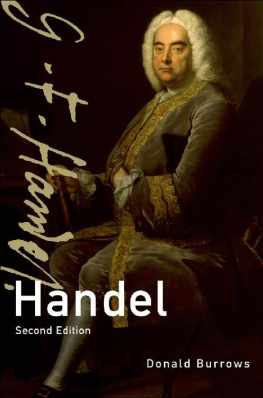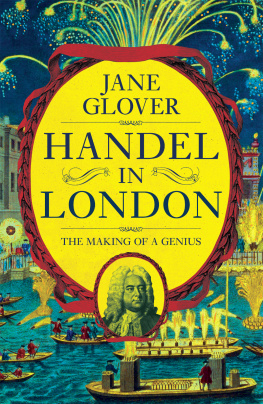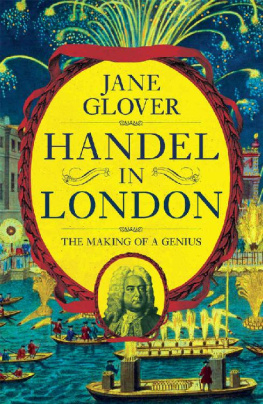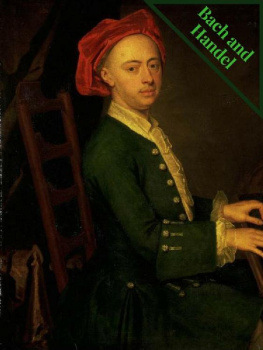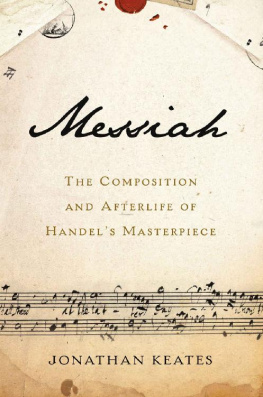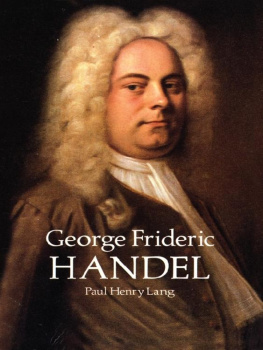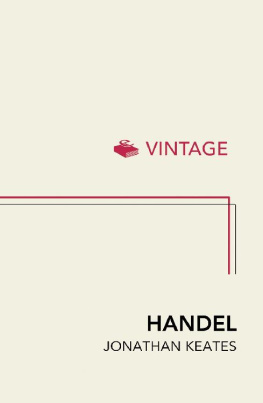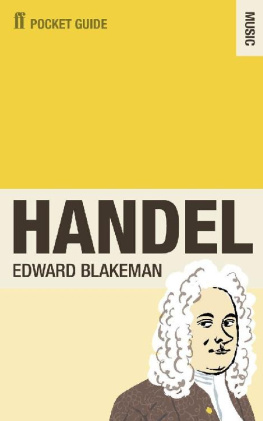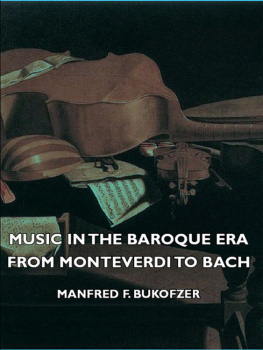THE MASTER MUSICIANS
HANDEL
SERIES EDITED BY R. LARRY TODD FORMER SERIES EDITOR, THE LATE STANLEY SADIE
THE MASTER MUSICIANS
Titles Available in Paperback
Bach Malcolm Boyd
Beethoven Barry Cooper
Berlioz Hugh Macdonald
Liszt Derek Watson
Mahler Michael Kennedy
Monteverdi Denis Arnold
Mozart Julian Rushton
Musorgsky David Brown
Puccini Julian Budden
Vivaldi Michael Talbot
Titles Available in Hardcover
Rossini Richard Osborne
Schoenberg Malcolm MacDonald
Tchaikovsky Roland John Wiley
Verdi Julian Budden
THE MASTER MUSICIANS
HANDEL

Second Edition
DONALD BURROWS


Oxford University Press, Inc., publishes works that further
Oxford Universitys objective of excellence
in research, scholarship, and education.
Oxford New York
Auckland Cape Town Dar es Salaam Hong Kong Karachi
Kuala Lumpur Madrid Melbourne Mexico City Nairobi
New Delhi Shanghai Taipei Toronto
With offices in
Argentina Austria Brazil Chile Czech Republic France Greece
Guatemala Hungary Italy Japan Poland Portugal Singapore
South Korea Switzerland Thailand Turkey Ukraine Vietnam
Copyright 2012 by Oxford University Press, Inc.
Published by Oxford University Press, Inc.
198 Madison Avenue, New York, New York 10016
www.oup.com
Oxford is a registered trademark of Oxford University Press.
All rights reserved. No part of this publication may be reproduced,
stored in a retrieval system, or transmitted, in any form or by any means,
electronic, mechanical, photocopying, recording, or otherwise,
without the prior permission of Oxford University Press.
Library of Congress Cataloging-in-Publication Data
Burrows, Donald, 1945
Handel/Donald Burrows.2nd ed.
p. cm.(The master musicians)
Includes bibliographical references and index.
ISBN 978-0-19-973736-9
1. Handel, George Frideric, 16851759. 2. ComposersBiography. I. Title.
ML410.H13B94 2012
780.92dc22
[B] 2010030254
1 3 5 7 9 8 6 4 2
Printed in the United States of America
on acid-free paper
Preface
HANDELS PLACE IN THE GALLERY OF MASTER MUSICIANS IS ASSURED by his creative achievements. During the 250 years since his death, his music has delighted, inspired and moved audiences in successive generations with a continuity that has been granted to few other composers, though the areas of emphasis within the repertory have varied. It so happens, however, that his biography is also significant and fascinating for other reasons. He became a public figure early in his career, attracting attention as such in Hamburg and Italy; in London his activities were reported in newspapers and in private diaries, and his status is intriguingly reflected in the statues for Vauxhall Gardens and Westminster Abbey. He enjoyed the benefits of considerable patronage from courts and aristocrats, and moved around in the centres of political and social influence. He manoeuvred skilfully to attain his own advantage while avoiding the identification with political parties; when his musical imperatives eventually crossed with factional politics in the 1740s, his established position was strong and he could tell one enquirer that the Prince of Wales was now quite out of his good graces. His activities in the theatre involved another area of political management, with patrons and performers, in order to maintain opportunities for his performances and to realise his musical intentions. By temperament, and also probably from practical necessity, Handel guarded his own privacy, but we know about some of his social relationships, and about the effects that his presence had on other people.
The outlines of Handels biography from 1711 onwards are largely controlled by the annual routines of his theatre performances. Those routines did not ensure that his life was uneventful, for various crises, artistic and (in the broadest sense) political, rocked the boat fairly frequently: no doubt he would from time to time have welcomed the prospect of a period of dull, routine success. That he had a strong personality is clear from the reactions of his contemporaries, and he must have had considerable personal charisma, which served to advance and stabilise his career, while attracting loyalty and opposition in about equal measure in his professional and social relationships. As a young man, coming from a family background of doctors and clerics, he repeatedly gained speedy access to the centres of power and influence, with such diverse patrons as Roman cardinals, German princes and Queen Anne of Great Britain. The lifetime pension granted by Queen Anne was supplemented by similar additional support from King George I and King George II: on this raft of financial security, augmented by profits from his later oratorio performances, Handel built up a considerable investment portfolio and died a rich man. In later years he emerges as rather excitable and impatient, yet also a generous and entertaining companion. His outward biography is complemented by the inner biography of his creative life, manifest to us through his musical legacy. For nearly fifty years he worked in what was probably the most commercially minded capital in Europe, his theatre career relied for a considerable time on the aristocratic system of annual subscriptions for his performances, and his ticket prices thereafter reflected continued reliance on a relatively small and wealthy social group, but nevertheless his relationship with his audience and his performers was characterized by obstinacy arising from strong commitment to his own creative agenda.
In dealing with the music I have chosen to focus on the development of his style and repertory from one period to another rather than to treat the operas, oratorios, concertos etc. in discrete chapters; consequently the musical , where Handels last major creative works are more conveniently dealt with in the context of the biographical chapter. I am aware of, and make no apology for, a certain amount of leakage elsewhere: there are areas where it is neither desirable nor efficient to banish musical discussion from Handels biography.
Within the confines of this book it is clearly impossible to pursue each of Handels works in detail. Accordingly, I have chosen a handful of the major works from each period as representative examples for rather more I have dwelt at some length on a single work (Giulio Cesare in Egitto) in order to provide an introduction to the span of a complete opera, and the nature of its musical components, which remained relevant to his subsequent oratorios.
Given the chronological framework of a biography, I have described Handels works primarily in terms of their periods and circumstances. There are various ways of approaching Handels musical style: one might, for example, follow through the influence of national, regional or genre styles, or of dance rhythms, or of Handels borrowings from his own music and from that of other composers. Any of those approaches, taken in detail, would require books as long again as this one, but I have attempted to draw attention to at least some of the relevant influences in each area. In the end, it matters less that labels are attached to musical influences than that due attention is given to the way that they were used and converted by Handel to his own purposes. It is his ability to match music to context, and to extend and integrate the musical materials with which he worked, that places him among the most remarkable composers.
Next page
